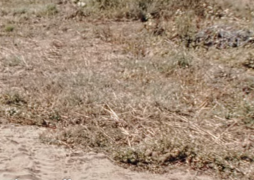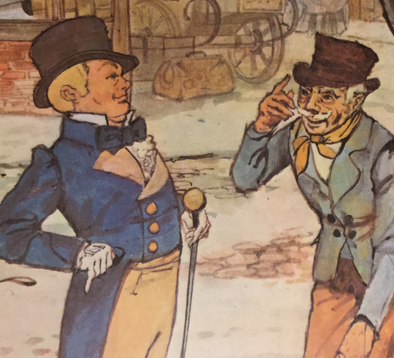
|
|
I am writing this on June 8, young Elisabeth's sixtieth birthday. Right now she is supervising students making some money by working on a trail through the woods in our municipality. She, along with others, is a volunteer who puts her heart in maintaining and enhancing trails for public recreation. 3 Well, I am an old fogey and I take pride in my children. Pride, mind you, not credit. That mostly goes to my wife. I know, I know, I am rambling. 4 I watched a movie last night; on Netflix. It is called "The Biggest Little Farm." An amazing story. So amazing that one is left to wonder whether it depicts fact or fiction. It turns out to be a true story of people who regenerated a delapidated single-crop farm into a lush and thriving enterprise. 5  The picture above is not staged. Neither is this picture of barren soil, which is a screenshot from the movie. (Picture credits: Neon.) 6 John and Molly Chester, we are told, had a dog that upset their neighbors by continual barking when they were absent from their apartment in Los Angeles. Their landlord had little choice but to evict them. Consequently, he, a filmmaker, and she, a chef, decided to buy a 200-acre property well away from the city and turn it into a farm for growing high-quality food chefs love. "The health of our food is really determined by how it is farmed," Molly said. "Her dream was to literally grow everything she could possibly cook with," John said. "And we'd do all of this in perfect harmony with nature." 7 They hired a consultant, Alan York, a pioneer in creating integrated systems that build soil fertility through composting, acquiring animals, growing ground cover, and practicing crop rotation. He pulled out a handful of weed, "This is devil weed. By the end of the day, you will have so much hate for this plant that you'll burn that stuff." That and puncture weed. "The objective is to emulate how natural ecosystems work," Alan explained. "They regulate themselves through diversity so you don't get epidemics of pest and desease.... Our goal is the highest level of biodiversity possible." 8 Five years after the property had been acquired, in 2011, their work began to show results. Thoughout, John played two roles, farmer and filmmaker. The second role culminated in "The Biggest Little Farm," which hit the silver screen in 2019. Quoting from a story by Andrew Amelinckx in the Modern Farmer: Resilience through diversity. Not putting all your eggs in one basket. 10 There is a counter-argument, of course. Isn't there always? It goes: "Put all your eggs in one basket, and watch that basket!" Well, let's see how that works. Bring on Ovid-19. 11 Watching the basket, guarding the basket, really, calls for foresight and readiness to act on it. In the case of the current pandemic, foresight was there; years ago. But even quite aside from finding a remedy, the preparedness for governments to act on it was not and still is not. Next question: Will it ever be? 12 Soon after I began writing my essay about our Senate, "On guard in a global environment," it struck me that this body would serve Canadians well by expanding one of its roles, its investigative role, to an "investigative, anticipating, and critical problem-solving role." At that time my thoughts dwelled on climate change, artificial intelligence, nuclear welfare, the destabilizing effects of black money and hidden financial assets, and a psychology of avoidance. Pandemics such as Covid-19 did not enter my mind until earlier this year even though already a year before then, Microsoft's Bill Gates gave a TED talk about how dangerously unprepared we are for anticipated pandemics, see here. Our Senate could/should have been anticipating this but it didn't, leaving others to hold the bag. So much for watching the basket. 13 Now that Ovid-19 has overturned the basket and politicians are groping about to save what eggs haven't broken yet and what others might still be consumed, all-the-while looking over their shouders at their electorates. They have come up wih a mantra: "restarting the economy"; presumably, that is, with the economy as it was before, the one people have come accustomed to. Nevertheless, a second wave of Covid-19—or some other virus altogether, or climate change, or nuclear warfare, or whatever—is likely to kill the battered economy of old with consequences harder still to effectively anticipate. 14 As for myself, I am pessimistic, but, still, I don't feel this is an excuse for not giving thought to finding a way out of the mess. It is said that the post-pandemic world will not ever be the same. For me such talk has a familiar ring. I am thinking of life under Nazi-Germany's occupation of The Netherlands and the insight it provides us with. Some people were giving thought what life would be after World War II, either under a Nazi regime or liberated from it. Thoughts went to peace ever after, thoughts went to meting out punitive judgment for those who collaborated with the Nazi regime, thoughts went to restoring the economy, thoughts went to reestablishing government control over what was then called "Dutch East Indies." A smorgasboard of thoughts. 15 Among those thinkers was Piet Lieftinck, who fought as an officer in the Dutch reserve and subsequently was detained by the German invaders. In detention, he was one of a small group of intellectuals of diverse stripe who gave thought to what needed to be done to bring The Netherlands back to health. In June 1945, a month after the war, Lieftinck became The Netherlands' minister of Finance. A third of the national assets had been destroyed. The government budget was in heavy deficit, which under the Nazi regime had been financed by simply printing money. 16 Lieftinck started off by taking bank notes out of circulation and requiring their holders to prove they were obtained legitimately. Citizens were given ten guilders in new banknotes to last them for a week. After that, banks were supplied with new banknotes, so that people could receive their wages. In the following months, the unblocking of frozen bank accounts began. This was followed through by imposing heavy taxes, ranging from 50 to 90 percent, on assets gained during the war and some time thereafter. Such was his way of pulling out the weeds and burn them. It still took years for the country's economic resilience to be restored, as it did to regenerate the soil of the "Biggest Little Farm." 17 * * *
While writing this piece, I came across an article in the New York Times about Modern Monetary Theory. It takes issue with the deeply ingrained notion that, in the word of former Prime Minister Margaret Thatcher of Britain, "the state has no source of money other than the money people earn themselves. If the state spends more, it can only do so by borrowing your savings or by taxing you more." The U.S., like a household, must aim to keep its spending within budgetary constraints. But like many a household, it has gone deeper and deeper into debt. at the peril of future generations. 18 Modern Monetary Theory brings out a fundamental flaw when this reasoning is applied to countries that, like the United States, are financially sovereign, meaning countries that can issue currency unrestrained by their annual budgets. Not that there is no restraint at all, but it is one imposed by the value of the sum total of all the assets held within the state, its real productive resources. I'll quote: "the state of technology and the quantity and quality of its land, workers, factories, machine and other materials." (At this point I am inclined to believe that the problem Piet Lieftinck aimed to solve was that this limit that had been breached during the German occupation.) 19 The article was an opinion piece written by Stephanie Kelton, a professor of economics and public policy and the author of a recently published book, "The Deficit Myth: Modern Monetary Theory and the Birth of the People's Economy." Economics has never been my cup of tea and until now I didn't even know, less understand, the meaning of monetary and fiscal policy. But in the light of what is happening right now—trying to come to grips with Covid-19 and allocating buckets of money to the unemployed and shuttered businesses—I decided to read it. 20 I made a start, but still have a way to go yet. One thing that struck me: the book should have been edited to remove a painfully excessive duplication and redundancy which makes it, for me anway, harder than necessary to hang on to the thread of the narrative. But never mind what I think; the book is highly rated by highly regarded economists in academia, in government, in major corporations. 21 Maybe I should summarize the main idea, a critical comparison of conventional (budget-oriented) thinking and the thinking of modern monetary theorists. I need to think about this. 22 * * *
It seems to me that the ways people govern themselves need regeneration. We might begin by narrowing our thinking down to regenerating democracy and try to fathom where that leads to. 23 The evidence that deterioration of democracy as we idealize it has been going on for years is substantial, but until recently it has been hard to face up to demagoguery's death knell. The problem is two sided: an unscrupulous manipulation of an electorate and an electorate that falls for it. What can be done to pull out the weeds and burn them? 24 At this point in time, Covid-19 is a threat to the survival of mankind. But it also has offered an opportunity if it can be timely subdued. Prime Minister Trudeau countered job losses and shuttered businesses with financial aid provided by the government. Unlike the provinces and municipalities, our federation enjoys financial sovereignty; it can overstep our annually set budgetary restraints. As one might expect, immediately there were those who began to abuse this measure by making fraudulent claims. Henceforth, Trudeau announced severe punishments—fines, incarceration—along with a forced reimbursement twice that of the sum illegally obtained. 25 Capitalism, free enterprise, reward for effort that benefits society. These notions, too, need regeneration. It seems to me that here we are up against exceedingly powerful forces sustained by huge capital assets in the hands of a few as well as by the now largely discredited doctrine of Social Darwinism that justifies political conservatism, imperialism, and racism, thereby discouraging intervention and reform. 26 We've got our work cut out, and then some. 28 Happy trails!. 29
|
--
| top of page |
|

